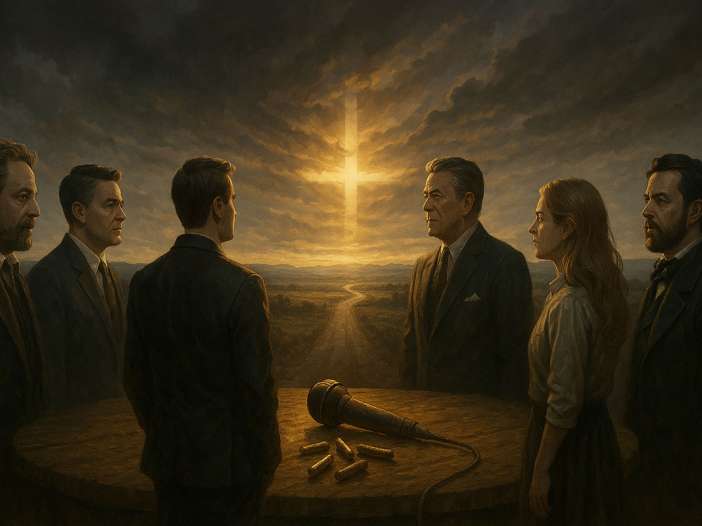
|
Getting your Trinity Audio player ready...
|
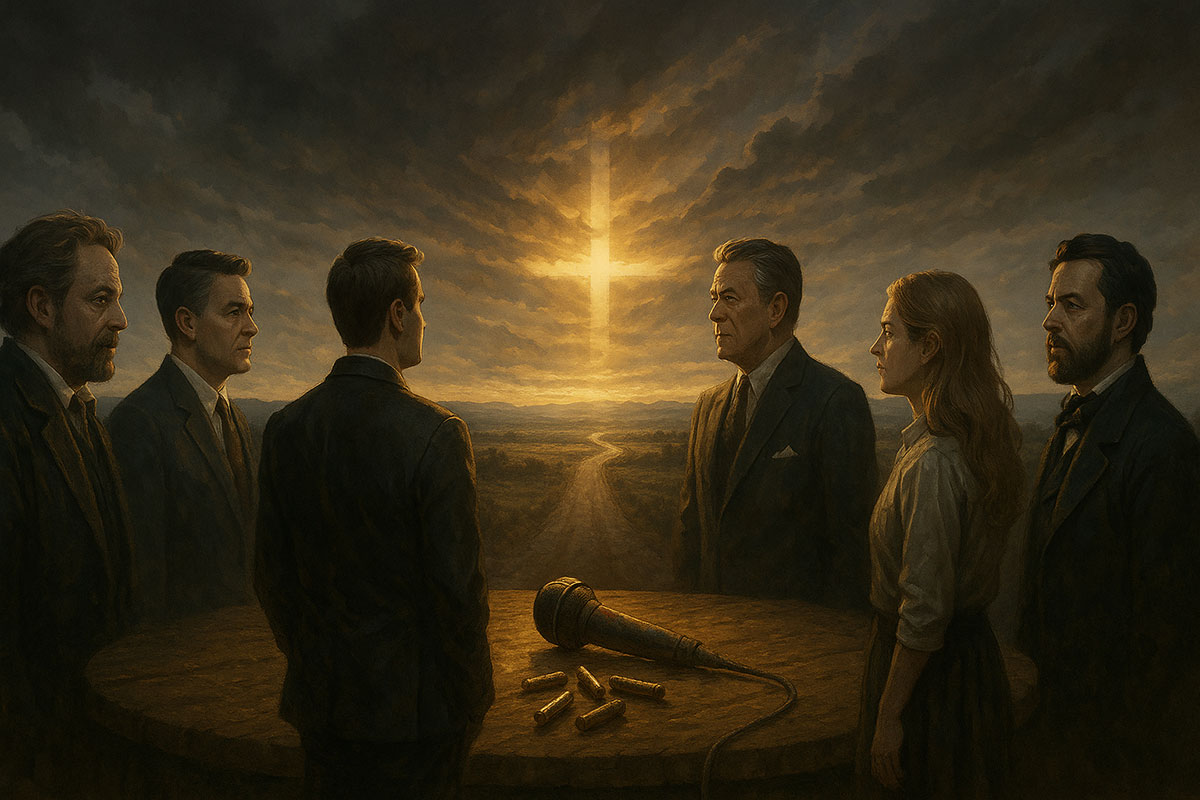
Introduction — C.S. Lewis
When we speak of legacy, we are not merely speaking of monuments or headlines. Legacy is the quiet resonance of a life faithfully lived, echoing long after the voice itself has gone silent. Charlie Kirk’s sudden death shocks us because it interrupts the ordinary rhythm of our expectations, and yet it confronts us with a truth as old as time: we are all temporary creatures in a world that is passing away.
But our stories do not end in silence. A man’s faith, his courage, his love — these outlast the years, even the centuries. And when a man dares to live not only for himself but for something greater, his influence becomes eternal. Tonight, in these conversations, we will not only remember a fallen man, but wrestle with the questions his life and death pose to us: What is faith? What is courage? What is the cost of truth? And what shall America, and indeed humanity, make of such a life cut short?
Let us begin, then, not with despair, but with hope — the hope that light shines brightest in the darkness, and that even in grief, we may glimpse eternity.
(Note: This is an imaginary conversation, a creative exploration of an idea, and not a real speech or event)

Topic 1. Faith, Legacy, and Mortality — What Do We Leave Behind?
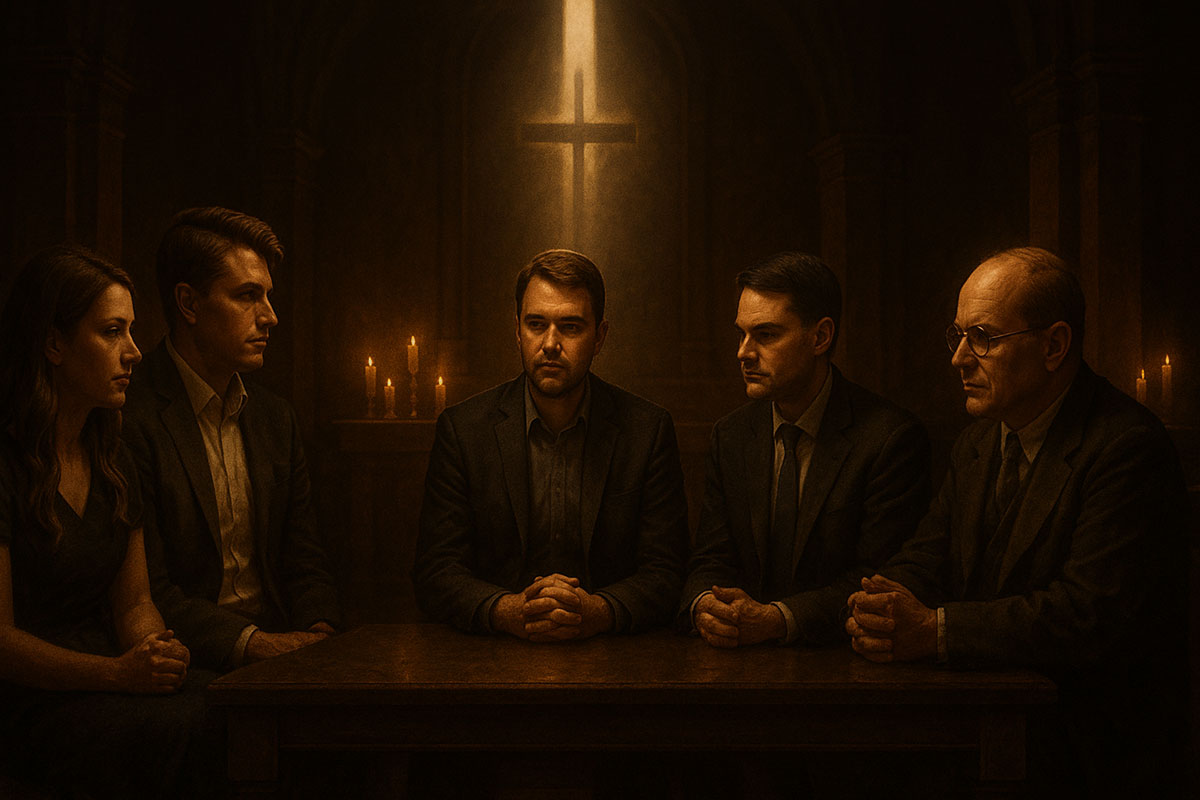
Participants:
Karen Armstrong (moderator)
Charlie Kirk
Isabel Brown
Ben Shapiro
C.S. Lewis
Dietrich Bonhoeffer
Karen Armstrong
Charlie, Isabel, Ben, Professor Lewis, Pastor Bonhoeffer — thank you all for being here. When we think about death, especially a violent one, the first question that arises is: What truly remains of a person? Is it their faith, their actions, their love, or the ideas they leave behind?
Charlie Kirk
I always said I wanted to be remembered for courage for my faith. At the end of the day, politics fades, victories are temporary, and fame vanishes. But faith in Jesus — that is eternal. If people say, “Charlie had courage for his faith,” then I lived rightly.
Isabel Brown
For me, Charlie’s legacy isn’t only about speeches or headlines. It’s about the quiet moments no one saw — him encouraging me, guiding my marriage, praying with me. What remains is how he made people feel valued and closer to God. That’s the true mark of a mentor and friend.
Ben Shapiro
Legacy has two faces. Publicly, it’s about impact — Charlie built structures, influenced thousands of young people, and fought battles in the culture. Privately, legacy is measured by whether you put family and faith above yourself. Charlie managed both, which is rare.
C.S. Lewis
You’ve all touched the truth. A man’s legacy isn’t in the clamor of applause, but in the unseen shaping of souls. We live in the shadowlands, but the choices we make cast light into eternity. What remains is the ripple of love and faith that outlasts us.
Dietrich Bonhoeffer
Legacy is obedience. I faced execution because I believed God demanded resistance to evil. What remained was not me, but the witness of faith under trial. Charlie’s courage, even in the face of threats, testifies that a life lived in truth is never wasted.
Karen Armstrong
Thank you. Let’s take this deeper. Faith and mortality always intertwine — some say faith makes us fearless, others say it sharpens our grief. How does faith transform our view of death and loss?
Isabel Brown
For me, faith turns despair into hope. I wept when Charlie was taken, but I also rejoiced, knowing he is alive in the fullness of eternal life. Faith doesn’t erase the pain, but it redeems it with the promise that this separation is not forever.
Ben Shapiro
As a Jew, I’d frame it differently: faith reminds us that life has purpose beyond ourselves. Death is not meaningless if the life served something greater. The grief is real, but faith tells us that values — God, truth, family — endure even when the person does not.
Charlie Kirk
Exactly. Death is terrifying without Christ. But with Christ, death is not the end — it’s the beginning. My last days, I spoke more about heaven than politics, because I knew this world is temporary. Faith transforms death into a doorway.
C.S. Lewis
I once wrote that Christians never say goodbye. Death is but a chapter break. Faith gives us courage because it reframes the story: this is not tragedy, but transition. Love is stronger than death.
Dietrich Bonhoeffer
On the day of my execution, I told a friend: “This is the end — for me, the beginning of life.” Faith does not minimize loss; it proclaims victory through it. That’s why legacy rooted in faith speaks louder than any monument.
Karen Armstrong
Powerful words. One last question: What responsibility do the living carry when someone of influence dies young? How do we honor their legacy without idolizing or distorting it?
Ben Shapiro
By continuing the work. Charlie’s voice is not silenced if others pick up the microphone, figuratively and literally. But we must also be careful not to mythologize him into perfection. His strength was that he was both a great man and a good man.
Isabel Brown
I feel the responsibility in my own life — to keep showing up, to be “salt and light” as Charlie taught. Honoring him isn’t about building a statue, but about carrying forward his example in small acts of faith and courage.
C.S. Lewis
The temptation after a death is to enshrine the person rather than embody their truth. The living must resist turning legacy into spectacle. Instead, they must live out the virtues the deceased cherished — otherwise the memory becomes hollow.
Dietrich Bonhoeffer
Yes. Legacy is not a shrine but a summons. When a voice is silenced, the living are called to become that voice. If you remember Charlie rightly, you will not only speak of him, but speak as he spoke — with courage rooted in God.
Charlie Kirk
And I would say this: Don’t just remember me. Remember Christ. If my life pointed people toward Him, then I am content. Carry that forward, and the legacy will never die.
Karen Armstrong
Thank you all. What remains is not just memory, but calling — a reminder that legacy is alive when it compels us to act. Faith doesn’t erase death, but it redeems it by binding us to one another and to God’s eternal story.
Topic 2: Martyrdom and the Power of Speech

Participants:
George Orwell (moderator)
Charlie Kirk
Ben Shapiro
Matt Walsh
Socrates
Martin Luther King Jr.
George Orwell
We meet here to discuss an ancient yet urgent question: Does killing a voice silence it, or does it make it louder? Across history, those silenced often grow louder in death. But is martyrdom truly the ultimate speech?
Charlie Kirk
I was killed while answering a question about transgender shooters. My enemies thought the bullet would end my words. But I know it won’t. If my death directs people toward courage and faith, then my voice is only beginning.
Ben Shapiro
That’s the paradox: the assassin thinks he silences, but he amplifies. When Charlie died, conservatives felt not fear but resolve. A martyr doesn’t end a movement — he multiplies it. My phrase was intentional: we will pick up the blood-stained microphone.
Socrates
They condemned me for “corrupting the youth.” Yet my death still speaks, for philosophy thrives centuries later. Martyrdom shows that truth cannot be slain. The hemlock ended my breath, but it gave eternal breath to my questions.
Matt Walsh
I’ve said that the measure of success is if enemies rejoice when you die. That means you shook the world. Charlie’s death proves the left saw him as a real threat. That hatred is testimony. A fighter martyred is stronger than one alive.
Martin Luther King Jr.
Yes, but we must be careful. Martyrdom isn’t something to be sought, but accepted if it comes. I did not wish for death, but I knew it might await me. If I die for justice, my dream still breathes. The moral arc bends, because blood waters it.
George Orwell
Let’s push further. Is there danger in glorifying martyrdom? Does it inspire courage, or does it risk encouraging death as a strategy?
Ben Shapiro
We must distinguish between living courageously and dying tragically. The goal is not to die, but to speak. Charlie never wanted a bullet; he wanted debate. The danger is in mythologizing martyrdom instead of living out conviction daily.
Charlie Kirk
I agree. I didn’t aim to be a martyr. But if death comes while standing for truth, so be it. The key is courage in life — because if you lack courage alive, you won’t find it in dying.
Martin Luther King Jr.
Martyrdom without cause is senseless; martyrdom with faith is witness. My role was to live in love, not die in hatred. But when death came, it confirmed that love is stronger. That is the paradox: death confirms life’s message if the message is love.
Socrates
We must always choose principle, not outcome. If principle leads to death, then death is but the price. One must not pursue death for glory, but accept it for truth.
Matt Walsh
But let’s not sanitize it. The reality is — we’re in a war of ideas. And war has casualties. If they kill one of us, the rest of us must double down. That’s how you honor the martyr — by fighting harder.
George Orwell
Finally, let me ask: What is the true power of speech? If speech can get you killed, why is it still worth it?
Charlie Kirk
Because speech transforms. Words change minds, hearts, even nations. Christ Himself was the Word. That’s why tyrants fear speech: it reaches where force cannot.
Ben Shapiro
Speech is civilization’s oxygen. Without it, society suffocates. The reason tyrants kill speakers is because ideas outlast regimes. Speech is dangerous precisely because it is immortal.
Martin Luther King Jr.
I said once, “Our lives begin to end the day we become silent about things that matter.” Speech is sacred because it awakens the conscience. Even when met with violence, its echo becomes unstoppable.
Matt Walsh
And speech is power. It can cut through lies, dismantle ideology, and inspire action. That’s why we keep speaking even when threatened. If they want silence, they’ll never get it.
Socrates
The examined life requires speech. Questioning, debating, seeking truth — that is the highest duty. To remain silent is to betray reason itself. That is why speech is worth dying for.
George Orwell
Then perhaps we can conclude: speech is the one weapon tyrants fear more than bullets. And martyrdom, though tragic, proves its eternal strength. Words do not die — they live, even in silence, even in death.
Topic 3: The Weapon and the Message — Symbols of Violence in Politics
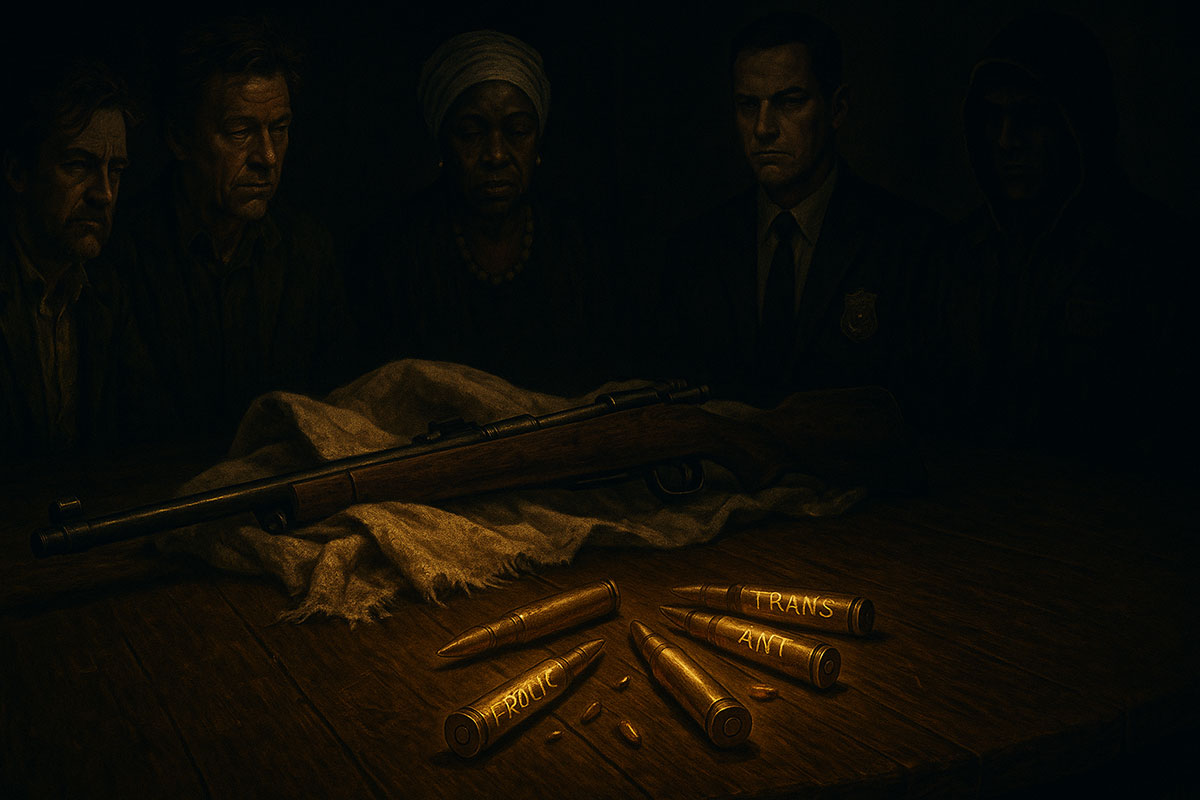
Participants:
Hannah Arendt (moderator)
FBI Investigator (fictionalized composite voice)
Suspected Assassin (imaginary reconstruction)
Christopher Hitchens
Václav Havel
Maya Angelou
Hannah Arendt
We are confronted with a disturbing fact: the rifle and ammunition linked to Charlie Kirk’s death were reportedly engraved with ideological messages — transgender and anti-fascist slogans. My question is this: what happens when weapons themselves become symbols of ideology?
FBI Investigator
From the law enforcement perspective, it’s troubling. Guns are tools, but here the tool was made into propaganda. Engraving ideology onto bullets suggests the shooter wanted each cartridge to carry a message beyond the act of violence itself — to turn ammunition into a manifesto.
Suspected Assassin
(quietly) Words on bullets… they were meant to strike fear, to show that even the weapon spoke. You all want to be heard; I wanted the world to hear me too. No one listened. So the rifle became my voice.
Christopher Hitchens
This is precisely the sickness of our age: when people abandon persuasion and adopt coercion. To carve slogans into bullets is not an argument; it’s nihilism dressed as ideology. It is the opposite of thought — the final collapse of debate.
Václav Havel
Yes, it is the language of power stripped of humanity. Under communism, we saw slogans everywhere — painted on walls, paraded in marches. But to place them on bullets is to confess that one has no faith in truth, only in destruction.
Maya Angelou
When you put words on bullets, you strip words of their beauty. A word should heal, lift, reveal. But on a bullet, it becomes poison. It says, “I will not speak with you, I will only end you.” That is not speech; it is silence made deadly.
Hannah Arendt
You all point to a deep crisis: when speech is replaced with violence. Let us ask: why do some choose violence as expression? Is it ideology, despair, or simply power lust?
Suspected Assassin
You call it violence; I call it proof. No one cared about what I believed until the rifle spoke. Despair? Yes. Rage? Yes. But above all — to matter.
FBI Investigator
In our work, we find most shooters aren’t purely ideological. It’s often alienation, grievance, a sense of invisibility. Ideology gives them a banner, but the true fuel is loneliness and bitterness.
Christopher Hitchens
That rings true. Ideology is the mask — the underlying impulse is resentment. They imagine the bullet proves their existence. But it’s cowardice. To kill instead of to argue is to confess bankruptcy of the mind.
Václav Havel
I agree. Violence arises when truth seems powerless. In my prison cell, I knew the regime had weapons, but I had words. And still, the truth endured. Those who use bullets instead of words proclaim their unbelief in truth itself.
Maya Angelou
Violence is what happens when the soul forgets its song. The assassin thought the rifle was a microphone. But the world hears music only from voices, not from gunfire. A bullet cannot sing — it only silences.
Hannah Arendt
Let us conclude with this: how should society respond to violence that disguises itself as political speech?
Christopher Hitchens
By refusing to dignify it as speech. Violence should never be mistaken for argument. Society must continue to debate fiercely — but exclude the bullet from the table.
FBI Investigator
For us, the answer is twofold: prevention and justice. We must track the roots of radicalization, but also prosecute without turning killers into heroes. The less spectacle, the better.
Maya Angelou
We respond with love louder than their hate. Not naïve love, but strong love — the kind that builds schools, heals wounds, writes poems, raises children who know how to speak instead of shoot.
Václav Havel
We must live in truth. If lies and despair breed violence, then truth and hope must be the antidote. A society that listens leaves fewer souls driven to carve words on bullets.
Suspected Assassin
(softly, fading) You will all speak of love and truth. Perhaps if someone had spoken to me first, I would not have spoken through the rifle.
Hannah Arendt
Then perhaps the final lesson is this: violence pretends to be speech, but it is the collapse of speech. To respond rightly, we must strengthen words, communities, and hope — so no one feels their only voice is a weapon.
Topic 4: Salt and Light — How Should Faith Influence Public Life?
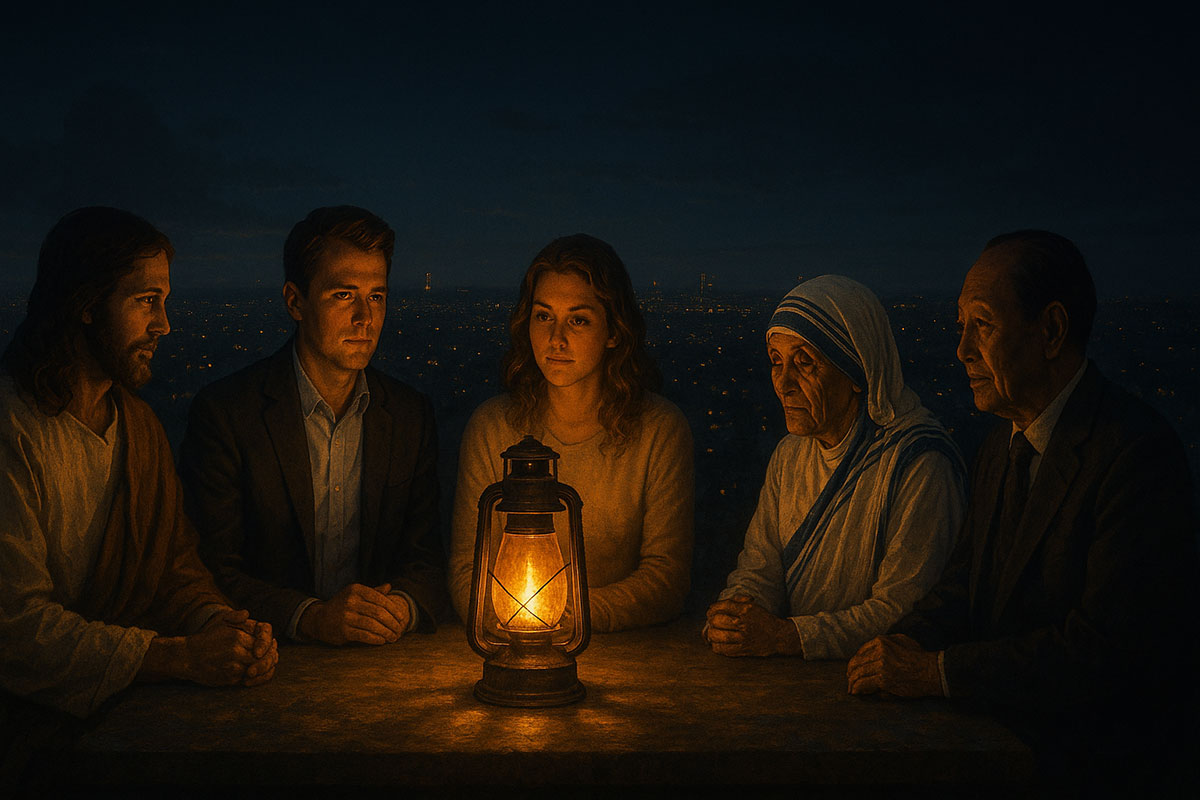
Participants:
Karen Armstrong (moderator)
Charlie Kirk
Isabel Brown
Jesus (Biblical voice)
Mother Teresa
Rev. Sun Myung Moon
Karen Armstrong
In the Sermon on the Mount, Jesus called his followers to be the “salt of the earth” and the “light of the world.” Tonight, I want to ask: What does it truly mean for faith to be salt and light in society today?
Jesus
Salt preserves, light reveals. My disciples are not called to hide away, but to transform their surroundings. Salt without taste is useless, and a lamp hidden under a basket brings no light. To be salt and light is to live so that truth, mercy, and justice shine through you.
Charlie Kirk
That verse became my rallying cry in my last speeches. To me, salt and light meant refusing to compromise with cultural decay. It meant living boldly as a Christian, shaping society with faith, not just hiding it in private.
Isabel Brown
For those of us who knew Charlie, he was salt and light in small ways too. Not just in speeches, but in late-night prayers, in encouraging others, in lifting burdens. Being salt and light isn’t just about politics; it’s about how faith shapes daily life.
Mother Teresa
Yes. Salt and light begin in love. Not great speeches, but small acts with great love. When you wash the feet of the poor, you preserve dignity. When you smile at the lonely, you light their darkness. That is how faith transforms the world.
Rev. Sun Myung Moon
Faith as salt and light means revealing God’s parental heart. If we see each other as brothers and sisters under one God, then society can be transformed. Without love rooted in God, culture decays; with it, families and nations can shine.
Karen Armstrong
Thank you. Let me press further: What are the dangers when faith enters public life? How do we ensure salt and light doesn’t become domination or division?
Isabel Brown
That’s the challenge for our generation. Faith can easily be twisted into control, or used as a weapon in politics. Charlie always reminded me: the goal isn’t power, it’s transformation. We influence by example, not coercion.
Jesus
You must remember: my kingdom is not of this world. Faith corrupted by ambition loses its saltiness. Light used to blind rather than guide becomes darkness. The danger is real — but the answer is humility and love.
Mother Teresa
The danger is when we forget the poor. If faith only speaks from podiums and not from the streets, it becomes proud. True salt dissolves in service; true light does not boast of itself.
Charlie Kirk
I saw the danger too — being accused of weaponizing faith. But I believed silence was worse. The key is courage with compassion. You can speak truth boldly without forgetting love.
Rev. Sun Myung Moon
Yes. Faith must not divide but unite. God is not the God of one party or one nation — He is the Parent of all humanity. If salt becomes prideful, it is wasted; if light blinds, it harms. True salt and light heal divisions.
Karen Armstrong
One last question: How can ordinary people live as salt and light in daily life, not just leaders or public figures?
Mother Teresa
Start small. Love your family. Feed a hungry neighbor. Smile at someone who feels forgotten. Do little things with great love, and the whole world is changed.
Charlie Kirk
For young people I spoke to, I always said: stand firm in truth, even when unpopular. You don’t need a stage to be salt and light. You need courage in classrooms, in families, in friendships.
Jesus
Live the Beatitudes. Be meek, merciful, pure of heart, peacemakers. That is how ordinary lives shine brighter than kings. Salt and light are not positions of power, but conditions of the heart.
Rev. Sun Myung Moon
Build families of love. Teach children that all people are God’s children. When families live as salt and light, nations will transform. The ordinary home can become a beacon for the world.
Isabel Brown
I’ll never forget Charlie saying: “Don’t wait for someone else to fight the battle of good and evil. Show up.” Being salt and light means showing up — in kindness, in courage, in conviction — wherever you are.
Karen Armstrong
Then perhaps the meaning is this: salt and light are not abstractions, but daily choices. To preserve, to guide, to illuminate — in public and in private. Faith in action is not domination, but transformation.
Topic 5: America After Kirk — What Direction Will the Movement Take?

Participants:
Alexis de Tocqueville (moderator)
Charlie Kirk
Ben Shapiro
Matt Walsh
Ronald Reagan
Isabel Brown
Alexis de Tocqueville
America has long wrestled with the question of its destiny — liberty, faith, and democracy intertwined. Charlie’s sudden death raises a pressing matter: what direction should the conservative movement now take?
Ben Shapiro
The path forward must be about institutional resilience. Charlie built Turning Point into a machine that energized young people. We must continue to cultivate that grassroots strength, ensuring that the movement isn’t centered on one personality, but on principles — free speech, family, and faith.
Charlie Kirk
I always said the future depended on young people taking courage. My absence doesn’t end the mission. It demands more people step up — to campuses, churches, local communities. The movement’s power was never me alone; it was the millions who believed they could make a difference.
Ronald Reagan
Conservatism must never lose its optimism. Charlie embodied that — a belief that America is worth fighting for. If the future becomes only about anger or vengeance, it loses the American spirit. We must inspire, not only resist.
Matt Walsh
I hear that, but let’s be honest: we’re in a cultural war. Optimism won’t save us if we’re unwilling to fight tooth and nail. Charlie knew that. His death shows the stakes. The direction is clear: double down on truth, no matter how offensive it feels to those who hate it.
Isabel Brown
I think both are right. We need courage and conviction, yes, but also hope. What Charlie gave me — and so many others — was the sense that we could live boldly as Christians without fear. That balance of truth and grace must be the compass going forward.
Alexis de Tocqueville
Thank you. Let us go deeper. How should faith shape the political future of America after such a loss?
Charlie Kirk
Faith isn’t a footnote — it is the foundation. Without God, America collapses into decadence. The movement must not be ashamed to proclaim truth rooted in Christ. Faith isn’t just private — it’s the light that must guide public life.
Ronald Reagan
Exactly. I said once, “If we ever forget that we are one nation under God, we will be a nation gone under.” Charlie understood this well. Faith should not be sidelined in politics; it should inspire character, honesty, and love of neighbor.
Matt Walsh
Faith must be unapologetic. Too many conservatives hide behind vague values. Charlie stood for Christianity boldly. The future demands we do the same, or else the cultural left will continue to impose its godless vision.
Isabel Brown
Faith also means humility and service. The risk is turning it into a hammer instead of a lantern. What I saw in Charlie was both courage and kindness. We must keep both — standing boldly, but never forgetting compassion.
Ben Shapiro
From my Jewish perspective, I’d say: faith provides moral clarity. We don’t all share the same theology, but what binds America is the belief that rights come from God, not government. That transcendent truth must remain at the heart of the movement.
Alexis de Tocqueville
One last question: How do we ensure Charlie’s legacy strengthens the movement, rather than creating dependence on his memory?
Isabel Brown
By living it out ourselves. Charlie’s impact was powerful, but he never wanted to be a cult of personality. He wanted a generation of leaders. The best way to honor him is to step forward and carry the mantle.
Ben Shapiro
Agreed. We must build structures that outlast individuals. Institutions, organizations, schools of thought. Charlie laid groundwork — we now must expand it, so it is not fragile but enduring.
Ronald Reagan
Leaders come and go. Principles remain. America after Charlie must remember that one man’s death cannot silence an idea rooted in truth. Optimism, freedom, and faith will carry on if the people believe in them.
Matt Walsh
And we mustn’t soften the edges. His enemies are celebrating because they think the movement is weaker. Prove them wrong. That’s how we honor his memory — not with tears, but with strength.
Charlie Kirk
Don’t just mourn me. Multiply me. If my life inspired courage, then live courageously. Don’t wait for another leader. Be the leader. That’s how the mission continues.
Alexis de Tocqueville
Then we can conclude: America after Charlie Kirk faces a crossroads. The way forward is neither despair nor dependency, but renewed courage, faith, and principle. His legacy is not to be enshrined but embodied — in every life that chooses to be salt and light.
Final Thoughts by Martin Luther King Jr.
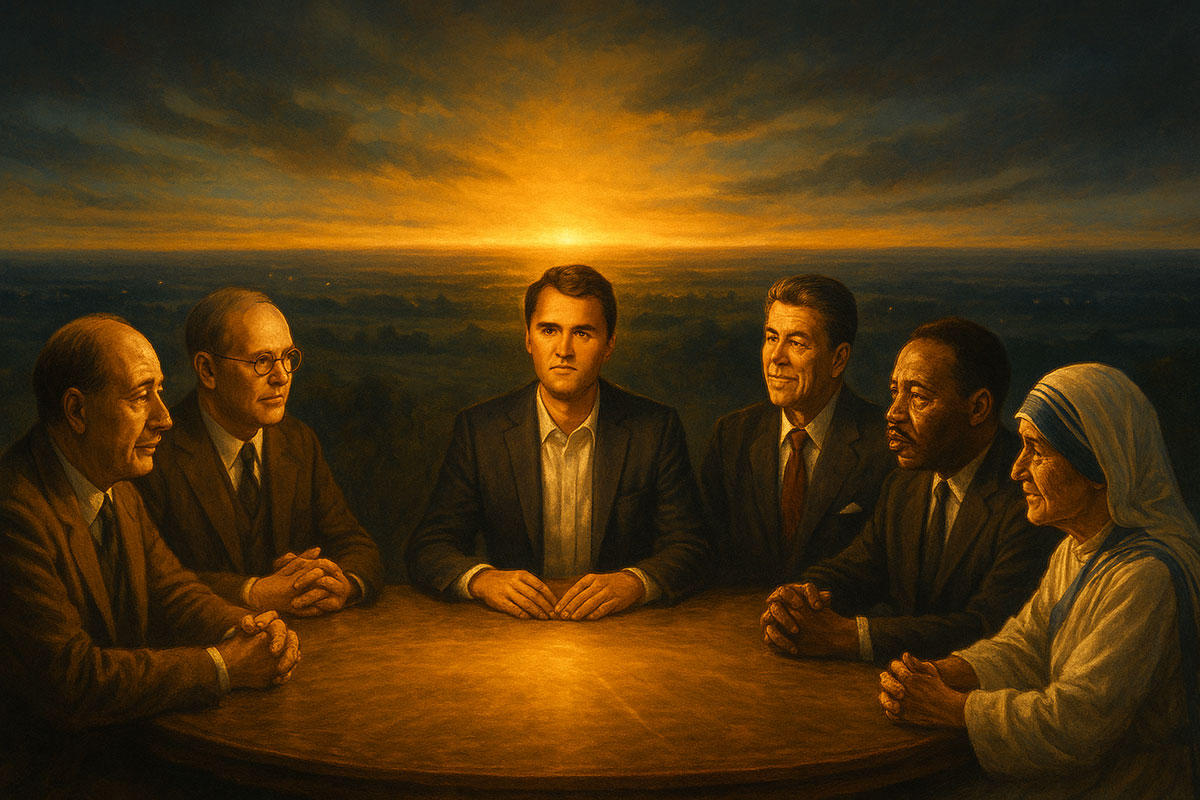
My brothers and sisters, we have spoken of salt and light, of martyrdom and legacy, of weapons and words, of America’s future. But let us be clear: the measure of a life is not in how long it endures, but in how faithfully it serves. Charlie Kirk, like so many before him, has reminded us that a voice lifted for truth can be silenced in body but never in spirit.
We must not retreat into fear. We must not allow bitterness to take the place of courage. Instead, we must rise. For the truest way to honor a life cut down is not in tears alone, but in carrying forward the mission with renewed love, renewed strength, renewed faith.
I have often said that darkness cannot drive out darkness; only light can do that. Hate cannot drive out hate; only love can do that. The world may have lost a fighter, but heaven has gained a witness. And his voice, joined with all who came before, calls us now: to speak boldly, to love deeply, to live courageously.
Let us go forward, then, not as mourners but as torchbearers. For Charlie’s light shines on in us — and together, we can ensure it never goes out.
Short Bios:
Charlie Kirk – Founder of Turning Point USA, Kirk became one of the most influential conservative activists of his generation, remembered for his outspoken defense of faith, family, and free speech.
Isabel Brown – Author and conservative commentator who was mentored by Charlie Kirk, known for her work with young audiences and her advocacy for faith and cultural renewal.
Ben Shapiro – Editor emeritus of The Daily Wire, a leading conservative voice recognized for his sharp debating style, defense of free speech, and commitment to traditional values.
Matt Walsh – Cultural commentator at The Daily Wire, author and filmmaker, known for his unapologetic stance on issues of faith, family, and gender.
C.S. Lewis – Renowned Christian writer and Oxford professor, author of Mere Christianity and The Chronicles of Narnia, celebrated for his insights on faith, morality, and the eternal.
Dietrich Bonhoeffer – German pastor and theologian, executed in 1945 for resisting Nazism, remembered for his writings on discipleship, courage, and the cost of faith.
Socrates – Ancient Greek philosopher, executed for “corrupting the youth,” who embodied the principle of pursuing truth through questioning, even at the cost of his life.
Martin Luther King Jr. – Civil rights leader who advanced nonviolent resistance and racial equality, remembered for his dream of justice and his martyrdom in pursuit of freedom.
Christopher Hitchens – British-American essayist and critic, known for his sharp intellect, defense of free thought, and critique of ideology and authoritarianism.
Václav Havel – Czech dissident playwright and later president, whose moral courage and belief in “living in truth” helped bring down communist rule in Eastern Europe.
Maya Angelou – Beloved American poet, author, and activist, who used her voice to champion dignity, resilience, and the transformative power of words.
Mother Teresa – Catholic nun and Nobel Peace Prize laureate, founder of the Missionaries of Charity, remembered for her selfless service to the poorest of the poor.
Rev. Sun Myung Moon – Founder of the Unification Movement, who taught that God is the Parent of all humankind and emphasized family, unity, and faith as the path to peace.
Ronald Reagan – 40th President of the United States, remembered for his optimism, conservative leadership, and commitment to freedom and faith in America’s destiny.
Alexis de Tocqueville – 19th-century French thinker, author of Democracy in America, whose insights on liberty, faith, and civic life remain vital for understanding American democracy.
FBI Investigator (fictionalized) – A composite voice representing the perspective of law enforcement, tasked with uncovering truth and evidence in the wake of political violence.
Imagined Assassin (fictionalized) – A constructed figure symbolizing alienation and radicalization, offering insight into how ideology and despair can distort words into weapons.

Leave a Reply